IRTC call for submissions
25 April 2018 | From the VC’s Desk
Dear member of the UCT community
Please take note of two important messages pertaining to the Institutional Reconciliation and Transformation Commission (IRTC).
1. The IRTC has extended the deadline for representations in the first phase of its work.
The IRTC in its first phase considered whether students who were granted clemency for incidents stemming from the Shackville incident of February 2016 can be granted amnesty and has recommended that Council grant amnesty to eight of the cases heard thus far. In doing so the IRTC stated: “The IRTC recognises the difficulties and imperfections of the process we are involved in. Amnesties and reconciliation involve trade-offs between justice and forgiveness, usually in the interest of a bigger goal. In the case of UCT, this is to advance the cause of reconciliation and transformation at the institution to enable the university to carry out its knowledge work under a conducive environment. The IRTC approached its work with this understanding. The commission recognises the fact that there might be individuals or groups who do not fall in the category that appeared before us, but who might have been impacted negatively, hurt, wronged or their dignity undermined by events at the university during the period in question. We call upon such individuals to approach the commission through representations.”
Members of the UCT community are therefore invited to make representations to the IRTC by 3 May in relation to its first phase of work: the amnesties and the impact of the protests and disruptions on them.
2. The IRTC calls for submissions for the second phase of its work.
The IRTC will soon begin the second phase of its work. This phase requires the IRTC to hear submissions from members of the UCT community and to then “make recommendations on institutional culture, transformation, decolonisation, discrimination, identity, disability, labour relations and any other matters that the university community has raised over the years or may wish to raise”.
The IRTC are now inviting all members of the UCT community to make submissions on the issues raised in the terms of reference (as per the paragraph above).
In addition to the above, the IRTC felt that opinions on the following topics need to be canvassed as well, and the community is invited to make submissions on:
- gender-based violence
- accommodation
- security.
How to make a submission
All submissions/representations to the IRTC (whether phase 1 or 2) should be submitted to Candice Amon.
Please ensure that a submission does not exceed 15 pages. Should your submission exceed four pages, kindly ensure that there is an executive summary pertaining to each theme.
The due date for representation in respect of phase 1 is 3 May 2018.
The due date for submission in respect of phase 2 is 4 May 2018.
Confidentiality
It is important to note the following in terms of confidentiality: All evidence or information provided by any person to the IRTC in the course of its work will be confidential if so requested, to be disclosed to any other person or entity only with the consent of the person who has given the information, and only in an effort to achieve greater understanding, reconciliation and transformation. The commissioners will also ensure that the evidence or information is conveyed to any other person or entity on a confidential basis. The commissioners undertake not to disclose the evidence provided by any person to any law enforcement authority, including the police or the prosecution service.
In conclusion, I urge members of the university community, students and staff, to take advantage of this opportunity to share with the IRTC their views on these two sets of issues.
Sincerely
Dr Max Price
Vice-Chancellor
Read previous communications:
 This work is licensed under a Creative Commons Attribution-NoDerivatives 4.0 International License.
This work is licensed under a Creative Commons Attribution-NoDerivatives 4.0 International License.
Please view the republishing articles page for more information.
Institutional Reconciliation and Transformation Commission (IRTC)
The Institutional Reconciliation and Transformation Commission (IRTC) Steering Committee was established as a result of a period of unprecedented tension at the University of Cape Town (UCT) at the end of 2016. The creation of the multi-stakeholder steering committee that will oversee the proposed IRTC was one of the resolutions made in the 6 November 2016 agreement, which effectively brought the waves of continuing protest at the university to a halt.
The agreement, which was signed between the UCT executive and protesting student groups, paved the way for the establishment of the IRTC, whose aims are to
- consider all Shackville-related protests of 2016, including disciplinary procedures and interdicts
- invite submissions from all constituencies on clemencies that were granted and decide whether clemency should be turned into amnesty
- make recommendations on how the university should deal with pending cases and other such matters in the future
- make recommendations on institutional culture, transformation, decolonisation, discrimination, identity, disability and any other matters that the university community has raised over the past 18 months, or may wish to raise in the future.
The IRTC’s objective is to map an inclusive and fair course for the university as it tackles the legacy of the so-called Shackville protests and to focus on the issues that have caused division on our university campus.
Read IRTC documents:
- Read the 6 November agreement
- Read the declaration by students seeking clemency
- Read the FAQ about the agreement
- Read the criteria and process for nominating commissioners - List of Steering Committee Members
- Names of the IRTC Steering Committee members
- Email addresses of the IRTC Steering Committee members
- See the announcement of the IRTC Commissioners
- IRTC Final Report
A summary and analysis of the Terms of Reference are given in Chapter 2, starting on page 7
Feedback and responses to the IRTC report:
IRTC Final Report

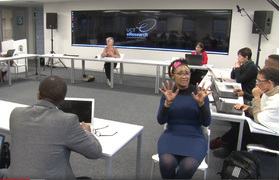

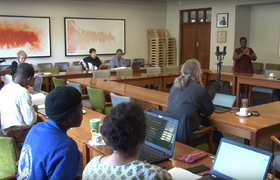

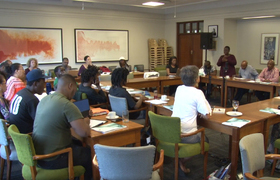
Statements by the IRTC
Latest news
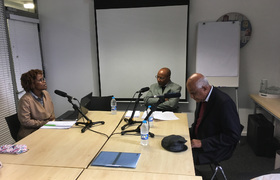
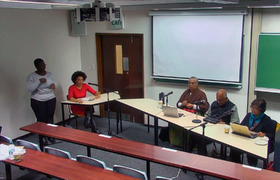


Reports from the Steering Committee Chair


2018 IRTC Steering Committee meetings
2017 IRTC Steering Committee meetings





















